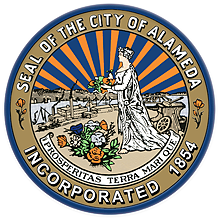www.alamedaca.gov/keepalamedasafe
The City takes pride in providing quality public services — like rapid police, fire, and emergency medical response, park maintenance, and pothole repair — that help contribute to local quality of life, making Alameda a desirable place to live, raise a family, and start a business.
However, despite proactively planning for long-term financial stability and maintaining an adequate emergency reserve, our City faces a structural deficit of several million dollars in the coming fiscal years.
A deficit of this magnitude will deplete emergency reserves and could result in a reduction in essential City services, including police, fire, and paramedic services, which may lead to slower 9-1-1 emergency response times. It will also prevent ongoing investments in critical infrastructure like maintenance of neighborhood parks, pothole and street repairs, and other improvements.
In order to maintain the City’s financial stability and protect general City services, the City Council is placing a 0.5% sales tax measure on the November 2018 ballot. With so much uncertainty in the federal government, this increase (equal to five cents on a $10 purchase) is a local solution to provide a dedicated funding source to support essential City services such as:
 Police response to violent crimes and burglaries
Police response to violent crimes and burglaries
 Rapid 9-1-1 emergency medical and fire response
Rapid 9-1-1 emergency medical and fire response
 Neighborhood park maintenance
Neighborhood park maintenance
 Pothole repair and the maintenance of safe and clean streets
Pothole repair and the maintenance of safe and clean streets
 Protecting the Bay from pollution
Protecting the Bay from pollution
For more information on how to Keep Alameda Safe, Clean, and Financially Stable, please email citymanager@alamedaca.gov.
Measure F Frequently Asked Questions (FAQs)
Q. What types of city services contribute to the City of Alameda’s high quality of life?
A. Alameda has long been known for its strong quality of life, historic, small-town charm and unique and vibrant character. The City takes pride in providing quality public services — like rapid police, fire and emergency medical response, park maintenance and pothole repair — that help contribute to local quality of life, making Alameda a desirable place to live, raise a family and start a business.
Q. How does the City of Alameda ensure the safety of its residents?
A. According to a recent city survey, two-thirds of Alameda residents rate public safety as a top priority. The City has kept crime rates low and our Police and Fire Departments have maintained rapid emergency response times. In fact, Alameda’s police officers, firefighters and paramedics responded to more than 70,000 9-1-1 calls for crimes, fires and medical emergencies in the last year.
Q. How is the City responsible for keeping local parks and beaches clean and well-maintained?
A. The City invests $4.7 million annually to ensure that local parks, beaches and waters are safe and clean for residents. In fact, Alameda is home to twenty-one neighborhood and community parks. Our unique position as an island in the Bay requires that we maintain infrastructure to prevent waste from running off into and polluting the Bay.
Q. What is the condition of our streets and roads?
A. The City currently spends roughly $4 million annually to repair potholes, cracks and other street deterioration to maintain the safety of drivers, pedestrians and bicyclists. Even with these current investments, Alameda has a backlog of $25 million worth of street maintenance and road repair projects.
Q. What is the current state of the City’s budget?
A. The City has been a responsible steward of limited funds, proactively planning for long-term financial stability and maintaining an adequate emergency reserve. However, even with these proactive steps, our City faces a structural deficit of several million dollars in the coming fiscal years. The City is required to maintain a balanced budget, so the deficit must be addressed through services cuts or revenue enhancements. To help protect high priority services from budget cuts, the Alameda City Council voted to place Measure F, the Alameda Essential Services Protection Measure, on the November 2018 ballot.
Q. Why do we have a growing budget deficit?
A. Several factors contribute to the City’s budget deficit. These issues are not unique to Alameda and are being experienced by all cities in the Bay Area and throughout California. (1) The cost of living and providing essential city services has increased significantly in recent years — particularly in our region — and revenues are not keeping up. (2) As consumers make more purchases online, the City receives less sales tax revenue from purchases at local stores. (3) The state mandated amount cities must contribute to retiree pensions is increasing. The City is legally required to fund retirement benefits for employees who served the City in the past and are already retired. While the City has taken many steps to reduce retirement obligations to current and future employees, the cost of funding pension obligations for past employees will continue to increase in the coming years. With expenses outpacing revenues, changing consumer habits and rising pension costs, we must raise locally controlled revenues, or make significant service reductions to parks, public safety and other city services.
Q. How will Measure F protect funding for these essential city services?
A. Measure F, the Alameda Essential Services Protection Measure, would increase the local sales tax rate by 0.5% and provide approximately $5 million to fund local city services. With so much uncertainty in the federal government, this increase (equal to five cents on a $10 purchase) is a local solution to provide a dedicated funding source to support essential city services such as:
- Police response to violent crimes and burglaries
- Rapid 9-1-1 emergency medical and fire response
- Neighborhood park maintenance
- Pothole repair and the maintenance of safe and clean streets
- Protecting the Bay from pollution
Q. What happens to public safety and other essential services if this isn’t passed?
A. Without securing new revenue sources, it is projected that emergency reserves will
be depleted. This may require reductions in core services, including possible cuts to police, fire and paramedic services, which comprise 75% of the City’s budget. It may also be necessary to reduce or eliminate ongoing investments in critical infrastructure like maintenance of neighborhood parks, pothole and street repairs, and other improvements.
Q. How can I be certain that all funds would be spent as promised?
A. Funds from the Alameda Essential Services Protection Measure would be subject to independent audits and public review of spending. In addition, prior to adopting the City’s biennial budget, the City conducts public workshops and hearings to hear from residents about how they want to spend the City’s money. These meetings are open to all residents and the public is encouraged to attend.
Q. Could the state or federal government cut or take Measure F funding?
A. No. By law, Measure F funds could not be taken away by the state or federal government, ensuring that local tax dollars stay here, giving Alamedans local controls over local funds.
Q. Does Measure F ensure that Alameda’s visitors pay their fair share?
A. Yes. A sales tax measure is not a property tax and visitors would pay their fair share, ensuring that local homeowners and renters don’t shoulder the entire burden.
Q. Do sales tax measures affect essential purchases like groceries and medicine?
A. No. By law, essential purchases like these are exempt from sales tax. Gasoline is not exempt from sales tax.
Q. How much would Measure F cost?
A. The measure would provide $5 million annually to maintain and enhance public safety and essential city services by increasing the sales tax rate by 0.5%. For example, a half-cent increase would add five cents to a $10 purchase. Groceries, medicine and other essential items are excluded from sales tax.
Q. How can I learn more?
A. We encourage you to reach out with any questions or comments to citymanager@AlamedaCA.gov.
Q. What steps has the City already taken to reduce pension costs?
A. The City has taken a number of steps to address pension costs:
Try to keep all service contracts flat (no automatic escalators)
State pension reform, from age 50 to 57 for safety, and from age 55 to 62 for miscellaneous
Reduction in retiree benefits for safety employees from family to individual only
Employees must pay more toward retirement (PERS is in lieu of Social Security: safety up to 20% of their salary, miscellaneous close to 10% of their salary
Council adopted a Pension/OPED policy - ½ of annual surplus over reserve goes toward paying down liability
City staffing levels are 20% lower than before the recession from 640 in 2004 to 526 in 2018
Q. Can employees spike their pensions in their last year to increase their benefits in retirement?
A. No.
Q. Why are you doing this now when the budget deficit does not start for three years?
A. In order to properly plan for future expenditures and ensure that key city services like police, fire and parks are adequately funded, the City needs to plan at least three years in advance. Additionally, our budget deficit will be ongoing and continue to grow. We need a local solution now to secure the long-term financial stability of the City.
Q. Why is the money going to the general fund?
A. The City’s deficit will impact essential city services that are funded through the City’s general fund. These include emergency response, park maintenance and public safety.
Q. How is Alameda attracting new businesses to the Island?
A. The City of Alameda’s Economic Development Department is successful at attracting new businesses to the island. Most recently, the Council adopted an Economic Development Strategic Plan, the City’s roadmap to achieving economic growth and improving the quality of life for Alameda residents and employees.
Q. How do the salaries of our first responders compare to others in the Bay Area?
A. In order to attract and retain well-trained and highly-skilled public safety officers, Alameda offers competitive compensation to police officers, firefighters and first responders.
Q. Will online sales ever be subject to sales tax?
A. The Supreme Court recently decided that online sales could be subject to sales tax. There is still a lot of uncertainty around how this would work in practice and if the City of Alameda were to get any portion of online sales tax revenue, it would likely be a small portion.
Q. How much revenue does the City receive from property tax revenue?
A. The City received $25.4 million in 2015, $27.4 million in 2016, and $28.7 million in 2017 from property taxes, but these increases have not kept pace with the rising costs of providing city services.
Q. Can’t we offer our employees 401k plans instead of pensions?
A. Pensions are a commitment we have made to the police officers, firefighters and City employees who have served our City well for decades.
Pulling out of the state public employee pension system would not relieve Alameda of any pension obligations and would actually increase pension costs to the City due to expensive exit fees. The CalPERS termination liability at 3% discount rate is:
- Safety: $753,433,744 (current assets $253,587,646, unfunded share is the difference between the two)
- Miscellaneous: $471,459,246 (current assets $203,560,016, unfunded share is the difference between the two)
Q. Does the City enforce traffic violations?
A. Yes, in 2017 the Alameda Police Department wrote almost 10,000 hazardous moving citations.
Q. What are you doing to improve traffic?
A. The City does everything within its means to reduce traffic congestion. The City of Alameda has been a good partner with local transit partners like AC Transit, BART and local ferry services to get cars off of the road and using alternate modes of transportation. Ultimately, promoting other modes of public transit will help reduce traffic on bridges and tunnels on and off the Island. Addressing our City budget deficit first will allow us to continue to focus on improving traffic.
Q. Are sales tax measures regressive?
A. Measure F would not increase the cost of medicine, groceries or other essentials that people depend on, as these items are not subject to sales tax. In fact, many city services that would receive Measure F funding support the City’s most vulnerable populations, including seniors on fixed incomes, children and working families. There is no senior exemption for Measure F, as any aged-based exemptions are not legally available for sales tax measures.
Q. Do sales tax measures hurt local business?
A. There is no evidence that increases to sales tax rates discourage patrons from supporting local businesses. Research suggests that an extra five cents per $10 spent is not enough incentive for a consumer to change their buying habits. Plus, essential purchases are exempt from sales tax. Many other cities in the East Bay have recently passed sales tax measures and have not experienced any adverse effects on local businesses.
Q. How long does Measure F last and will it ever increase?
A. Measure F provides a stable and ongoing source of funding for City services. The rate cannot be increased or changed without a vote of Alameda residents.
Q. Who paid for the recent mailing to Alameda residents?
A. The City of Alameda funded the recent informational mailer to ensure that the community has access to the facts related to our city budget in order to cast an informed vote this November. The cost of the mailer was $17,600 from the City’s general fund. The City is sending a second mailing with key election dates and information in September and expects that mailer to have a similar cost.
Q. Does the City collect revenue from new developments in Alameda?
A. Yes. The City has taken every legal step available to maximize the fees it charges to developers. Even still, these increases in revenues cannot be relied upon on an annual basis and will not address the City’s looming budget deficit.











